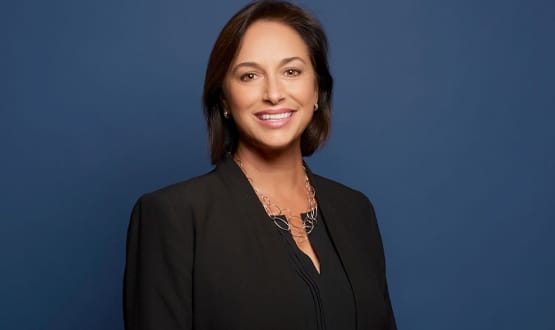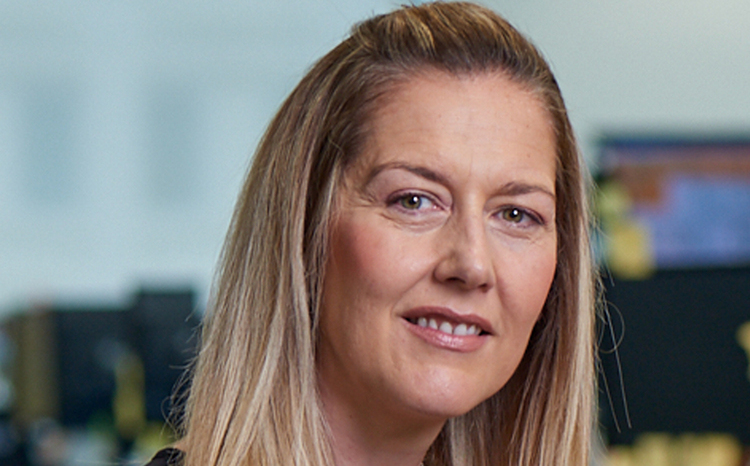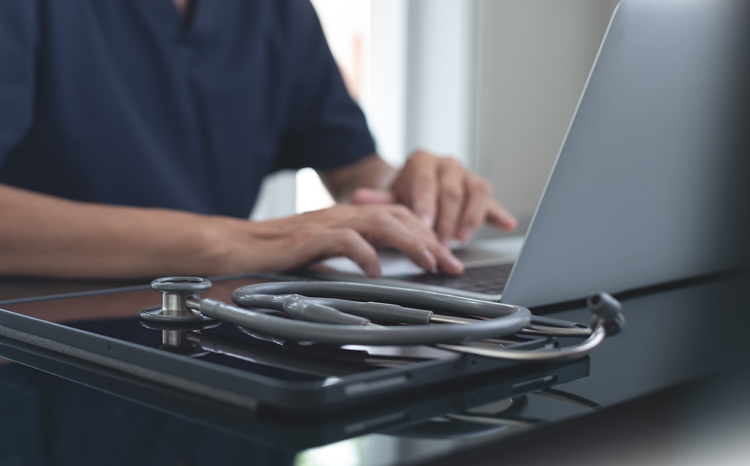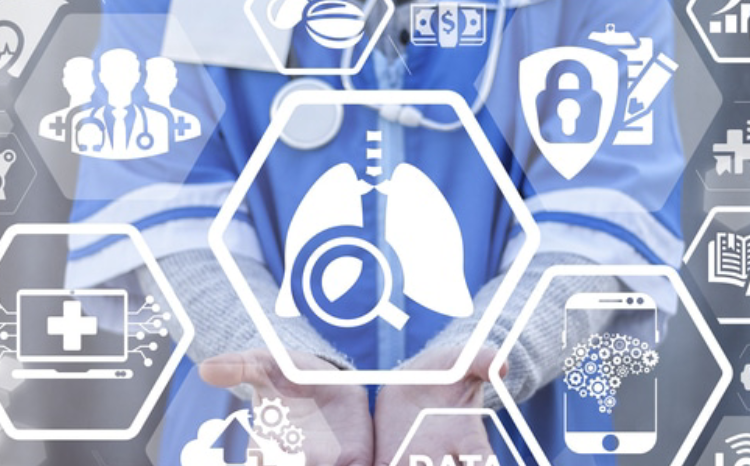Google Health’s Karen DeSalvo says trust is ‘job one’
- 28 June 2023

Google’s search engine and YouTube channel have brought it global name recognition. Now the tech giant wants to become the responsible face of health knowledge through Google Health
The company’s chief health officer Karen DeSalvo spoke to Digital Health News about Google’s latest plans in health in an exclusive interview at NHS Confederation Exp 2023.
“We have a really bold ambition to help billions of people be healthier,” she explained. “And that’s everyone everywhere; not some people, some places. We have this mission that we want to build inclusive technology and information that brings everybody along.”
Three out of four people use the internet to find out about a health problem before they seek care from a physician, she says, and many consult friends or neighbours or listen to artists or sports figures that they trust.
Google has gained a font of knowledge about how people use information platforms to learn about their health conditions through the company’s own platforms and applications, including Search and Maps. YouTube provides a particular opportunity for the company to identify trusted messengers that are easy for people to find and help them with their content by providing high quality information.
Google and the NHS Confederation issued a joint report earlier this month looking at the role of technology in healthcare that found that 83% of people are currently using some form of technology for their health and 78% said they would use technology if the NHS recommended it to them. More significantly, 58% of respondents believe that if they don’t have the correct technology in the future, their access to healthcare may be reduced.
Dr DeSalvo, a physician, former head of the Office of the National Co-ordinator, and former US acting Assistant Secretary of Health under President Barack Obama is a high-profile ambassador for Google’s health credentials. Establishing trust with health users is “job one” she said. As a practicing doctor, DeSalvo said her patients are likely to be more reticent if they are unable to trust her, and the same is true for a company that is trying to be a reliable source of information.
A broad view of health services
The more “generic” aspect of Google’s services, ranging from Search to YouTube’s more customised messenger platforms, can be enhanced by personalised insights such as Fitbit steps or sleep monitoring collected on Google’s hardware through Fitbit steps, or sleep and vital sign monitoring from Pixel phones and watches.
In recent years, Google also has been developing its hardware in partnerships with healthcare systems, consulting with organisations such as the NHS to learn how wearables can help with cardiac rehabilitation or lower blood pressure in individuals and populations, DeSalvo says.
The final element of Google’s health toolbox is its platforms: cloud and Android mobile. Both create a scaffold for enterprises and developers to build tools onto, allowing the company to reach many more people.
The four billion Android phones in use globally provide an affordable tool in the pocket of patients and carers in developing countries. Google continues to work with organisations such as the World Health Organisation (WHO) and developers to build applications useful to those in low- middle- and high-income markets.
“Matching people with the right health information is a question of meeting them where they are in that consumer-driven, digital first place,” DeSalvo says. “We know we’ve got to also help healthcare systems and doctors and enterprises.”
Building in equity by design
Google builds all of its products with inclusion in mind, DeSalvo says, and has an entire team looking at health equity and supporting all of the division’s product areas. The pandemic period of was a key learning period for the company with regard to information quality. Google Health created a health information quality group and has been accelerating its work.
Although it is only a few years old, the group has partnered with knowledge panels so someone using the company’s search platform to look for information on diabetes, for example, is more likely to see a site with a checkmark from the NHS.
The company also has the capacity to interrupt user intent when it suggests they may cause themselves harm – such as those searching for information on suicide or sites championing eating disorders. Instead, the platform will show them telephone numbers for helplines. In some regions, the company is also working with governments to include chat options that can provide a higher level of support to vulnerable users, DeSalvo says, adding, “we have a lot of latitude on You Tube to do this work.”
Google Health has an “authoritative information framework” – built with input from the National Academy of Medicine, the WHO and the Association of Royal Medical Colleges, with replicate data from countries across the world to help the company make a definitive decision about what is high-quality information. Part of the framework allows national and global authorities, including accrediting organisations for physicians or ministries of health, to label information as evidence-based and approved by a reputable source. Earlier this month, the company extended its framework in the UK to allow licensed healthcare providers to sign up to be designated as credible sources of information.
DeSalvo added: “There are tools in our toolbox, but we’re also learning with our partners in the ecosystem – medicine, public health and consumers. How are you looking for information? And how do we want to make sure you can get steered to the highest quality? How do we take down misinformation?”
An AI-first company
Artificial intelligence (AI) is intrinsic to the health “tools” that Google Health is using, from measurement of heart rates to the “health shelves” that the company used to make the most accurate and evidence-based information available to users.
And it is playing a significant role in helping Google develop new health products and refine existing ones. As a diagnostic tool, AI has already been used to help with mammogram screenings in Australia and the rapid developed of large language models (LLMs) has helped to make these tools more efficient, DeSalvo says, describing AI as a kind of “utility knife” for the company’s health offerings.
The company already has seven key principles relating to AI: it must be socially beneficial, it should avoid creating or reinforcing unfair bias; it should be built and tested for safety; it should be accountable to people; it should incorporate privacy design principles; it should uphold high standards of scientific excellence; and it should be made available for uses that accord with each of the principles.
These principles, she adds, “are a physical manifestation of not only how we build product, but they are also a filter.” Products are also screened by the company’s equity team and, in the case of medical grade AI, the company’s products go through the requisite regulatory process.
Google Research has developed Med-PaLM a large-language communication model designed to provide high-quality, helpful long-form medical answers to consumer health questions, as judged by panels of both physicians and users. The initial version, released in late 2022, was the first AI system to score 65% on US Medical License Exam (USMLE) -style questions, above the standard 60% pass mark. Med-PaLM 2, which was introduced at Google’s annual health event in March, achieved 85.4% on the USMLE questions.
DeSalvo said Med-Palm had been made available to just a few trusted partners in the US, including the Mayo Clinic, which agreed to the company’s AI principles and were “willing to sign on to a responsible way to test the model, as we’re all learning the power of its potential.”
“I think there is a potential for large language models to democratise access to help,” she says. “Especially for the billlions of people on the planet who don’t have access to healthcare right now, because large language models are such an important augment to the physical care systems – they can scale and expand and they also bring the best evidence to bear immediately.”
Building out such systems will indeed require a wider regulatory framework, something that Google supports as a company, she says.
DeSalvo is adamant that AI need not interfere with the doctor-patient relationship. She reflects on her own experience as a practicing clinician, trying to assemble information about a patient’s medicines, previous history to devise a care plan before she entered the consulting room so that she would be listening and observing carefully when speaking to a patient, rather than looking at a screen.
“Watching your body language and how you responded to my questions, all those things are context and intuition and all these sorts of things that I believe are essential to medicine. It’s also part of trust. But it took a lot of time to assemble all that data. And what AI and large language models allow us to do is to have the very best medical student you can imagine pull down all that information.”
“If the tools are just getting sharper and better, I think it is going to give more time and space for the humanity of medicine,” DeSalvo concludes. “AI won’t replace doctors; the doctors who use AI will replace the doctors who don’t.”





2 Comments
Until Google pay a reasonable and proper amount in tax toward ensuring people receive healthcare I wouldn’t be that minded to think their commitment to health is that robust.
Trust is “job one” and has been all along. Traditionally Google have struggled with it. Can you be the difference, Karen ?https://www.digitalhealth.net/2016/10/joes-view-of-consent-models/
Comments are closed.